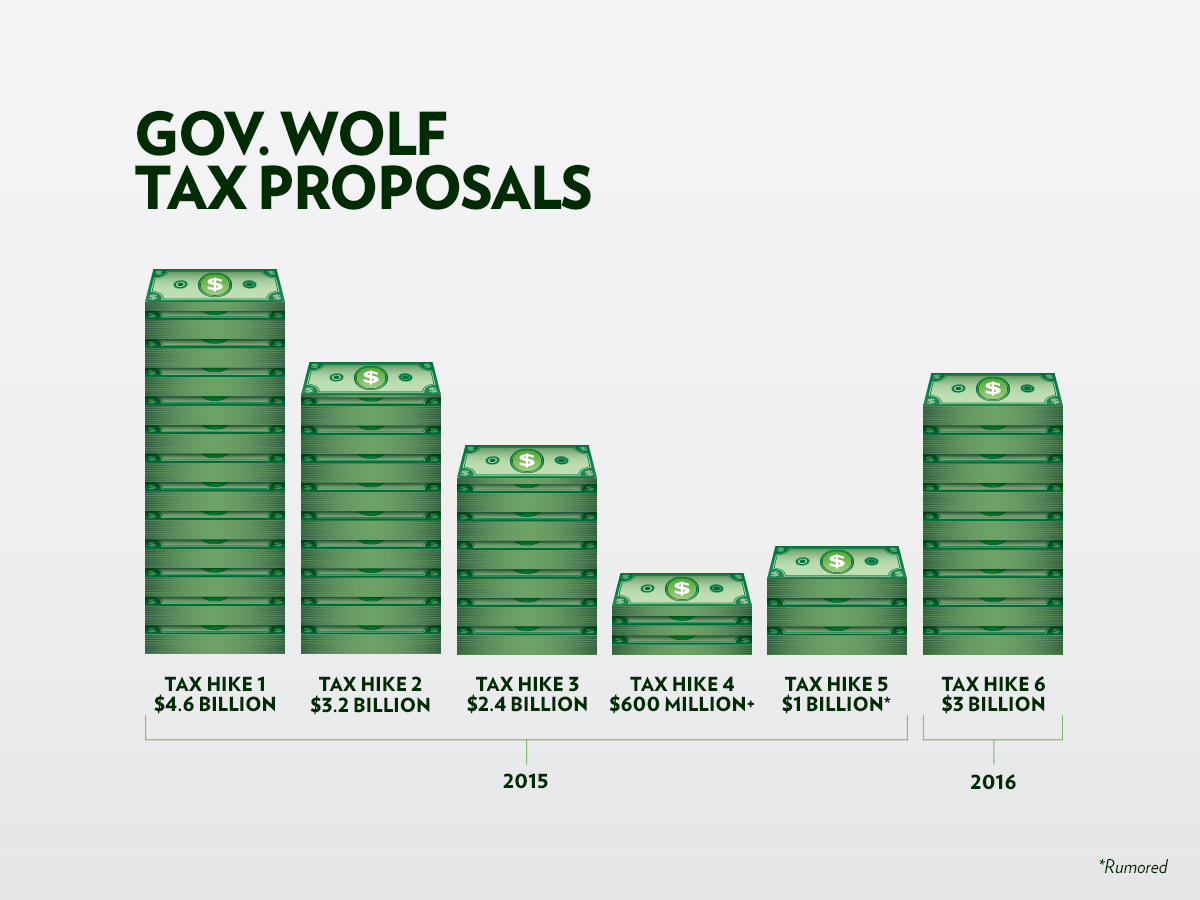Memo
A Brief History of Wolf’s Tax Hikes
In 2015, Gov. Tom Wolf proposed five broad-based tax hikes on working families—each of which was eventually rejected by state lawmakers.
Here's some background on each of Gov. Wolf’s tax demands.
Tax Hike Proposal #1
In his budget address, Gov. Tom Wolf proposed a massive $4.6 billion tax hike, with a net increase of about $1,400 per family of four. Every income group would have paid higher taxes under Wolf's plan.
This proposal was never introduced in the House, and in the Senate—where revenue legislation can’t begin anyway—Sen. Vince Hughes failed to get any cosponsors. When offered as an amendment to another bill in June, this proposal received exactly zero votes in the House.
Tax Hike Proposal #2
Wolf’s second call for new taxes came in September. This plan modified his original budget—mainly with a smaller income tax hike, no increase in the sales tax rate, and fewer new items subject to the sales tax—to generate $3.2 billion (or just over $1,000 per family of four). Legislative leaders promised Gov. Wolf a vote on this plan, and gave him time to lobby for votes.
After realizing there was little support for this plan, the governor quickly transitioned to a third tax hike proposal.
Tax Hike Proposal #3
To see if there was legislative support for tax hikes, Gov. Wolf altered his plan to include just a personal income tax increase and a natural gas severance tax (on top of the current impact fee tax). This plan would have generated $2.4 billion ($744 per family of four).
The House held a vote on this proposal in October. It failed by a 73-127 count. That is, 64 percent of the House voted against this tax hike, including all Republicans and nine Democrats.
Tax Hike Proposal #4
Wolf’s fourth tax hike plan centered around raising the sales tax rate to 7.25 percent—the second highest state rate in the U.S.—with revenue to be used for property tax reductions. At the same time, the plan called for taking existing property tax relief funds from gaming to use for new state spending—about a $600 million net tax increase.
This plan received little support, and strong opposition from both Democrats and Republicans. It quickly fell apart and was replaced with a new “framework.”
Tax Hike Proposal #5
While the details were never publicly disclosed, Wolf’s fifth tax hike plan included some combination of imposing the sales tax on currently untaxed goods and services, raising tobacco taxes, raising taxes on banks, and a new fee on businesses just for the right to stay open.
Like all previous plans, this framework didn't generate much support. Democrats even have said that to support the sales tax increases, they want more tradeoffs—including raising the state minimum wage (which the Independent Fiscal Office estimates would result in 31,000 jobs lost).
The lesson
What Gov. Wolf should have learned by now is that there isn’t any support for broad-based tax increases. Families don’t want to pay more. Businesses don’t want to pay more. Voters don’t support higher taxes.
Republicans oppose massive tax hikes. Democrats oppose massive tax hikes.
It’s time to abandon these demands for massive, broad-based tax hikes.

